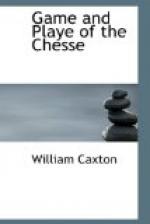[Illustration]
The fourth chapitre of the seconde book treteth of the ordre of cheualerye and knyghthode and of her offices and maners.
The knyght ought to be made alle armed upon an hors in suche wyse that he haue an helme on his heed and a spere in his ryght hande/ and coueryd wyth his sheld/ a swerde and a mace on his lyft syde/ Cladd wyth an hawberk and plates to fore his breste/ legge harnoys on his legges/ Spores on his heelis on his handes his gauntelettes/ his hors well broken and taught and apte to bataylle and couerid with his armes/ whan the knyghtes ben maad they ben bayned or bathed/ that is the signe that they shold lede a newe lyf and newe maners/ also they wake alle the nyght in prayers and orysons vnto god that he wylle gyue hem grace that they may gete that thynge that they may not gete by nature/ The kynge or prynce gyrdeth a boute them a swerde in signe/ that they shold abyde and kepe hym of whom they take theyr dispenses and dignyte. Also a knyght ought to be wise, liberall, trewe, stronge and full of mercy and pite and kepar of the peple and of the lawe/ And ryght as cheualrye passeth other in vertu in dignite in honour and in reu[=e]rece/ right so ought he to surmounte alle other in vertu/ For honour is no thing ellis but to do reuer[=e]ce to an other sone for y’e good & vertuo’9 disposicion y’t is in hym/ A noble knyght ought to be wyse and preuyd to fore he be made knyght/ hit behoued hym that he had longe tyme vsid the warre and armes/ that he may be expert and wyse for to gouerne the other For syn that a knyght is capitayn of a batayll The lyf of them that shall be vnder hym lyeth in his hand And therfore behoueth hym to be wyse and well aduysed/ for some tyme arte craft and engyue is more worth than strengthe or hardynes of a man that is not proued in Armes/ For otherwhyle hit happeth that whan the prynce of the batayll affieth and trusteth in his hardynes and strength And wole not vse wysedom and engyne for to renne vpon his enemyes/ he is vaynquysshid and his peple slayn/ Therfore saith the philosopher that no man shold chese yong peple to be captayns & gouernours For as moche as ther is no certainte in her wysedom. Alexandra of macedone vaynquysshid and conquerid Egypte Iude Caldee Affricque/ and Affirye vnto the marches of bragmans more by the counceyll of olde men than by the strength of the yong men/ we rede in the historye of rome y’t ther was a knyght whiche had to name malechete that was so wyse and trewe that whan the Emour Theodosius was dede/ he made mortall warre ayenst his broder germain whiche was named Gildo or Guye For as moche as this said guye wold be lorde of affricque with oute leue and wyll of the senatours. And this sayd guye had slayn the two sones of his broder malechete/ And dide moche torment vnto the cristen peple And afore that he shold come in to the felde ayenst his broder Emyon/ he wente in to an yle of capayre And ladde with hym alle the cristen men that had ben sente theder in




